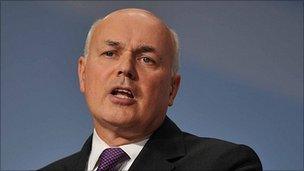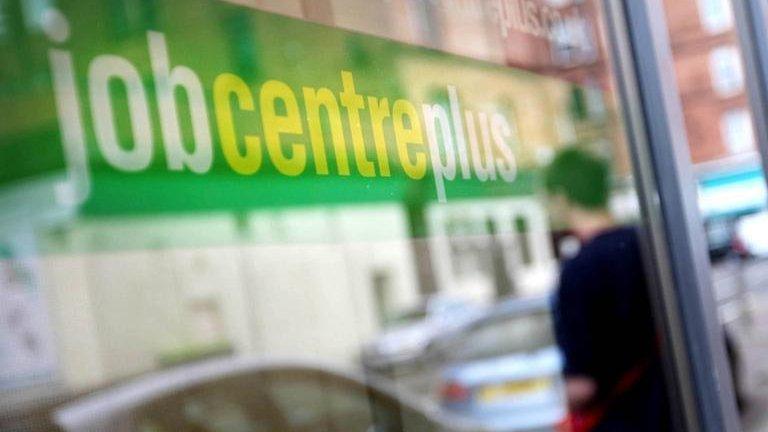Welfare overhaul plan passes first parliamentary hurdle
- Published

Iain Duncan Smith said he wanted to set a "new course" for the welfare state
Far-reaching proposals to overhaul the welfare system have passed their first parliamentary hurdle.
The government's welfare reform bill got its second reading in the House of Commons with a majority of 288.
During the debate, Work and Pensions Secretary Iain Duncan Smith reassured cancer charities that he would listen to their concerns over benefit changes.
Labour said they supported aspects of the proposed legislation but had reservations about its overall impact.
Labour MPs abstained in Wednesday's vote and their own amendment, raising various objections and urging further consultation, was defeated by 73 votes.
Charity concerns
Ahead of the bill's Second Reading, 30 cancer charities warned that disability benefit changes could leave people without financial support "when they need it the most".
Mr Duncan Smith said he was taking advice on issues raised and was not trying to harm cancer patients after the charities signed an open letter to the Guardian, external, raising concerns about changes to Employment and Support Allowance, which replaced incapacity benefit and Disability Living Allowance.
They were concerned that plans to limit ESA to one year would hit cancer patients who wanted to return to work but did not recovery quickly enough.
They also called for an end to an existing rule which allowed patients taking chemotherapy orally to be treated differently to those having injections.
And they criticised proposals that could see cancer patients have to wait six months, rather than three, to claim the new Personal Independence Payment that will replace DLA.
'Increased hardship'
They wrote: "Cancer treatment often starts very quickly following diagnosis and the needs associated with cancer can escalate rapidly. In the first six months following diagnosis, people with cancer face dramatically increased outgoings to cover expenses such as travel and parking for hospital appointments and extra fuel costs.
"Without support for these costs as soon as the need arises, people with cancer will face increased levels of hardship and some will get further into debt."
Opening Wednesday's debate, Mr Duncan Smith told MPs: "I think that the bill before us today... does set, I hope, a new course for the welfare state.
"I believe it will enable us to reach out to some of the groups of people that have become detached from the rest of society, trapped too often in a permanent state of worklessness and too often, in dependency."
Universal credit
The bill contains plans to replace six income-related work-based benefits with a single universal credit from 2013 - the government says it will make sure people are always better off in work and will close a loophole where some couples get more if they live apart.
There will also be an annual benefit cap of about £26,000 per family, and those refusing to work face a loss of benefits for up to three years.
Asked about the cancer charities' concerns, Mr Duncan Smith told MPs "very substantial changes" had already been made to support cancer patients.
But he said he understood concerns about oral chemotherapy and he had asked Professor Malcolm Harrington, who has reviewed the ESA system, to give advice on the issue.
"Professor Harrington will review that, will take evidence and we have asked the cancer groups to offer their thoughts and advice on this, as well as the medical fraternity and we will take consideration of what Professor Harrington says."
He added: "We are not in the business of trying to harm or affect cancer patients, quite the contrary, I think we have made some very serious changes to what we inherited from the previous government and that is what we will continue to do."
'Compassion test'
For Labour, shadow work and pensions secretary Liam Byrne pressed him to say that people with permanent disabilities would not have to repeatedly undergo assessments for disability benefits. He said: "Are you saying this afternoon that if someone is deaf-blind they will be recalled for regular checks under the regime that you are aspiring to put in place, yes or no?"
Mr Duncan Smith said that would be "looked at" during the bill's passage but it was "right" to see people and check on their condition, rather than leave them "parked forever on set benefits".
But Mr Byrne said some people should be exempted from having to "go through check after check".
More broadly, he said there were some aspects of the bill that Labour supported such as the introduction of the universal credit and efforts to tackle fraud in the benefits system.
But he described the bill as "ramshackle", in need of more thorough consultation, and failing the basic tests of "fostering ambition" and "nurturing compassion".
If issues raised by cancer charities were not addressed as the bill progressed, Mr Duncan Smith would have "single-handedly dismantled any notion compassionate Conservatism is truly a reality," he added.
- Published17 February 2011
- Published15 February 2015

- Published12 January 2011
- Published11 November 2010
- Published4 October 2010